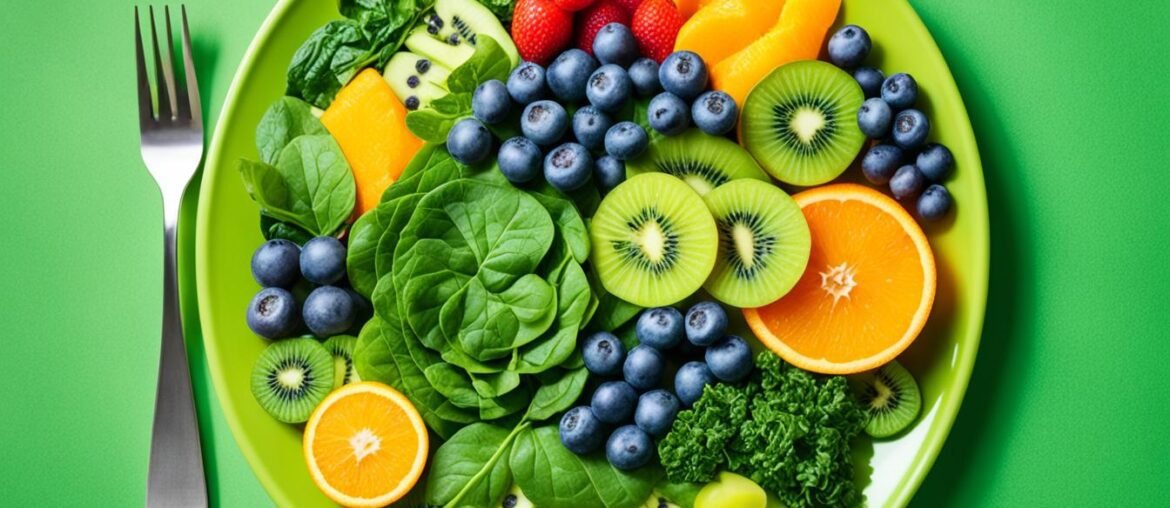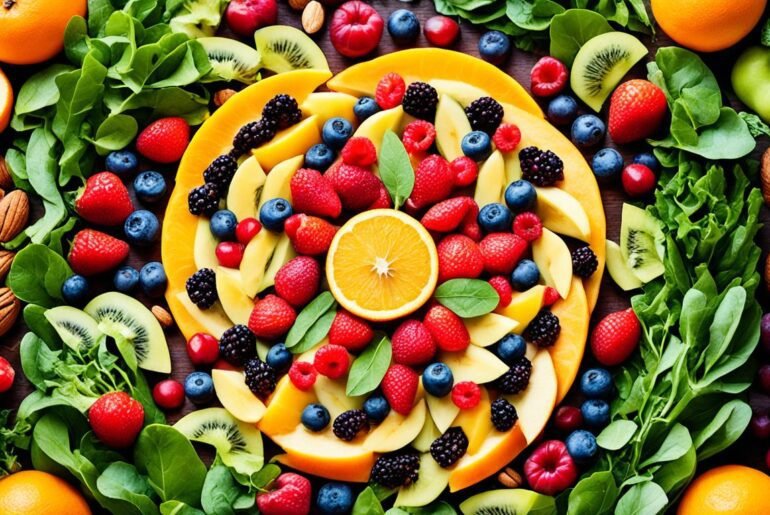Did you know that your diet plays a crucial role in the elasticity of your skin? The foods you consume can have a significant impact on the health and appearance of your skin. By incorporating specific nutrients into your diet, you can nourish your skin from within and promote its elasticity.
When it comes to improving skin elasticity, nutrition is key. Certain foods are rich in antioxidants and essential nutrients that can help rejuvenate and firm your skin. Including these foods in your daily meals can provide your skin with the nourishment it needs to maintain its youthful elasticity.
Key Takeaways:
- A healthy diet can significantly improve skin elasticity.
- Incorporating high-antioxidant and water-rich foods into your diet is essential for skin health.
- Foods such as berries, celery, cucumber, salmon, and walnuts are excellent choices for improving skin elasticity.
- Avoiding highly processed foods and simple sugars is crucial for maintaining skin elasticity.
- Adding vegetables to your meals and considering green juice can provide a nutrient boost for healthier skin.
The Role of Fatty Fish and Omega-3 Fatty Acids
Fatty fish, such as salmon, mackerel, and herring, play a vital role in improving skin health and maintaining skin elasticity. These fish are rich sources of omega-3 fatty acids, which are essential for the overall well-being of our skin.
Omega-3 fatty acids are beneficial for maintaining skin thickness, reducing inflammation, and protecting against harmful UV rays. They help keep the skin supple, moisturized, and resilient, minimizing redness and acne.
Fish oil supplements have also been found to have positive effects on the skin, particularly in fighting inflammatory and autoimmune skin conditions like psoriasis.
Fatty fish not only provide omega-3 fatty acids but also contain other essential nutrients that contribute to skin health. They are an excellent source of vitamin E, a powerful antioxidant that protects the skin from inflammation and free radicals.
Moreover, these types of seafood are packed with high-quality protein and zinc. Protein is necessary for the production of new skin cells and wound healing, while zinc regulates inflammation and supports overall skin health.
By incorporating fatty fish into your diet, you can nourish your skin from within and experience improved skin elasticity and a healthier complexion.
The Benefits of Avocados for Skin Health
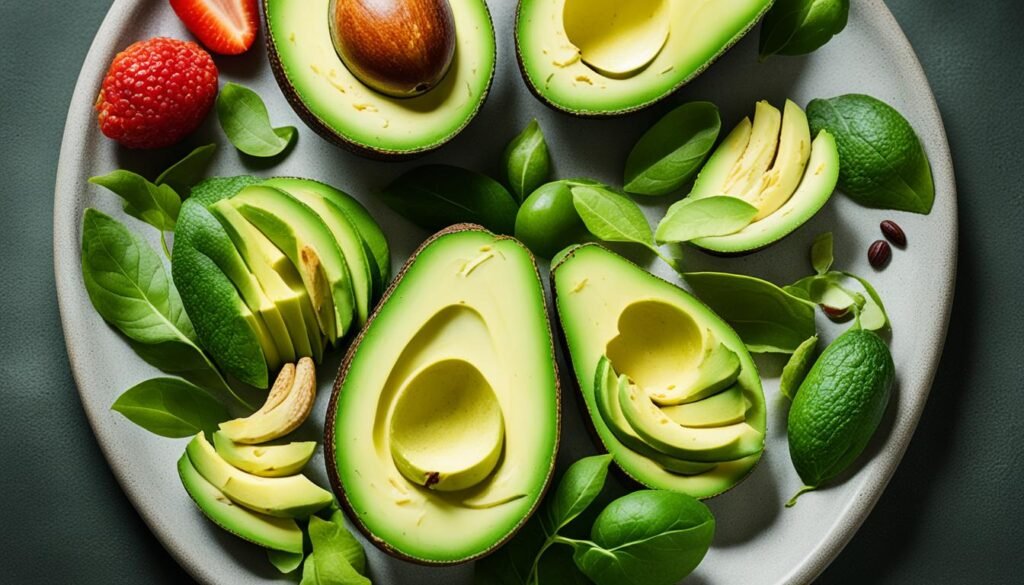
Avocados are a powerhouse when it comes to promoting healthy and vibrant skin. These delicious fruits are not only packed with flavor but also contain numerous essential nutrients that contribute to skin health and elasticity.
One of the key reasons avocados are beneficial for the skin is their high content of healthy fats. These fats help nourish and moisturize the skin, keeping it supple and flexible. A diet rich in healthy fats, such as those found in avocados, has been linked to improved skin elasticity and a more youthful appearance.
Avocados are also a fantastic source of vitamin E, a potent antioxidant that plays a crucial role in protecting the skin from oxidative damage caused by free radicals. This antioxidant action helps prevent premature aging and keeps the skin looking radiant and youthful.
Another important nutrient found in avocados is vitamin C. This vitamin is essential for collagen production, a protein that provides structure and elasticity to the skin. Adequate collagen production helps maintain a firm and resilient complexion, reducing the appearance of wrinkles and fine lines.
In addition to their rich nutrient profile, avocados also contain antioxidants that contribute to skin health. These antioxidants help protect the skin from sun damage and environmental stressors, such as pollution. By shielding the skin from harmful UV rays and reducing the effects of oxidative stress, avocados help maintain a healthy and youthful complexion.
Integrating avocados into your daily diet is a simple and delicious way to support overall skin health. Whether enjoyed in salads, spreads, or smoothies, avocados offer a plethora of benefits for your skin’s vitality and appearance. Make avocados a regular part of your healthy eating regimen and reap the rewards of a hydrated, radiant, and resilient complexion.
The Power of Walnuts for Skin Elasticity
When it comes to improving skin elasticity, walnuts are a powerful ally. These nutrient-packed nuts offer a multitude of benefits for your skin, thanks to their rich composition of essential fatty acids, vitamins, minerals, and antioxidants.
First and foremost, walnuts are an excellent source of omega-3 fatty acids, which play a crucial role in maintaining skin health. Omega-3 fatty acids have anti-inflammatory properties that help reduce skin inflammation and combat various skin conditions. By including walnuts in your diet, you can potentially curb skin inflammation and promote a healthier complexion.
Furthermore, walnuts contain omega-6 fatty acids, although in a balanced proportion with omega-3s. While omega-6 fatty acids are necessary for skin health, an excessive intake can lead to inflammation. The optimal ratio of omega-3 to omega-6 fatty acids in walnuts ensures a harmonious balance, supporting overall skin health without causing excessive inflammation.
Additionally, walnuts are a rich source of zinc, an essential mineral for maintaining healthy skin. Zinc contributes to the regulation of inflammation and helps support the integrity of the skin barrier. By incorporating walnuts into your diet, you can potentially enhance skin health and reduce the risk of developing skin conditions related to zinc deficiency.
Vitamin E, another skin-loving nutrient found abundantly in walnuts, offers potent antioxidant properties. This vitamin protects the skin from oxidative stress and free radicals, which can cause premature aging and skin damage. By consuming walnuts regularly, you can potentially shield your skin from harmful environmental factors and maintain a youthful appearance.
Notably, walnuts also provide selenium, a trace mineral that aids in the production of antioxidants, including glutathione. Selenium works synergistically with other nutrients to protect the skin from oxidative damage and maintain its overall health and vitality.
Last but not least, walnuts are a valuable source of protein, which is essential for skin repair, cell regeneration, and collagen synthesis. By including walnuts in your diet, you can contribute to the production of new skin cells and enhance the skin’s elasticity and firmness.
Overall, walnuts offer a wide range of skin benefits, from reducing inflammation and protecting against oxidative damage to supporting collagen production and maintaining overall skin health. By incorporating these nutrient-packed nuts into your diet, you can nourish your skin from within and promote improved skin elasticity.
Table: Nutritional Composition of Walnuts
| Nutrient | Amount per 100g |
|---|---|
| Omega-3 Fatty Acids | 9.08g |
| Omega-6 Fatty Acids | 38.09g |
| Zinc | 3.09mg |
| Vitamin E | 4.25mg |
| Selenium | 4.9µg |
| Protein | 14.32g |
The Skin-Boosting Effects of Sunflower Seeds
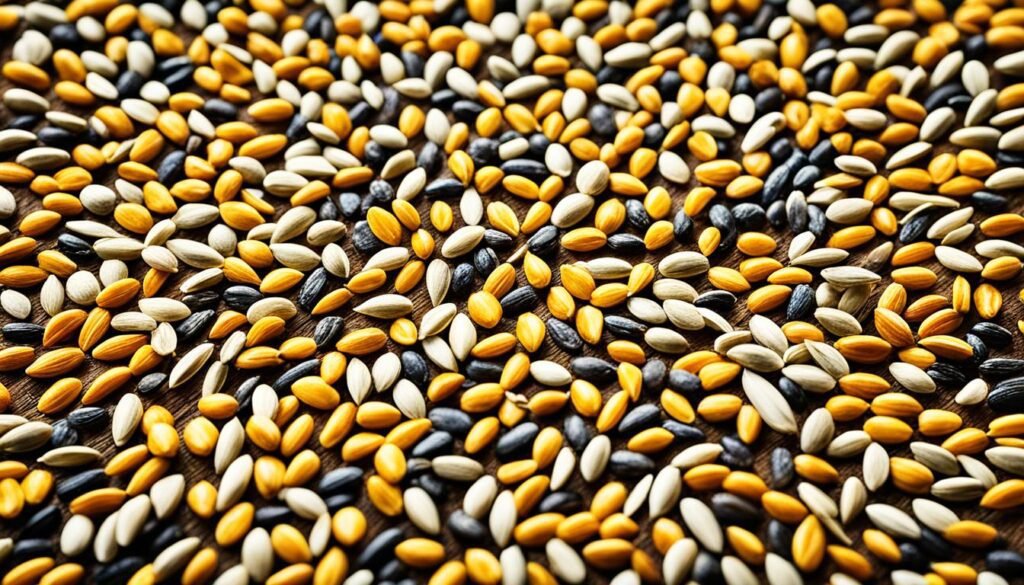
When it comes to improving skin elasticity, sunflower seeds are a secret weapon. These tiny seeds are packed with nutrients that support skin health and contribute to a glowing complexion.
One of the key nutrients found in sunflower seeds is vitamin E. This powerful antioxidant protects the skin cells from damage caused by harmful free radicals, helping to maintain a youthful appearance. Vitamin E also has moisturizing properties that can keep the skin soft and supple.
In addition to vitamin E, sunflower seeds are rich in selenium and zinc, two minerals that play vital roles in maintaining overall skin health. Selenium acts as an antioxidant, helping to neutralize the damaging effects of free radicals on the skin. Zinc, on the other hand, is essential for proper inflammatory regulation and the production of new skin cells, allowing the skin to heal and rejuvenate itself.
Furthermore, sunflower seeds provide a good amount of protein, another crucial nutrient for skin elasticity. Protein helps to support the structure and integrity of the skin, promoting firmness and reducing the appearance of wrinkles.
| Nutrient | Amount per 100g |
|---|---|
| Vitamin E | 35.17mg |
| Selenium | 53.7mcg |
| Zinc | 5.3mg |
| Protein | 23.4g |
To enjoy the skin-boosting benefits of sunflower seeds, you can incorporate them into your diet in various ways. Snack on a handful of roasted sunflower seeds, add them to salads or smoothies, or use them as a topping for yogurt or oatmeal.
Remember, a well-rounded diet that includes a variety of nutrient-rich foods is key to maintaining skin health. By including sunflower seeds in your daily routine, you can nourish your skin from within and achieve a radiant complexion.
The Skin Benefits of Sweet Potatoes
Eating a diet rich in nutritious foods is essential for maintaining healthy skin and improving skin elasticity. One such food that offers numerous benefits for your skin is sweet potatoes. These root vegetables are packed with essential nutrients that promote skin health and protect it from damage.
Sweet potatoes are an excellent source of beta-carotene, a precursor to vitamin A. Beta-carotene acts as a natural sunblock when incorporated into the skin, protecting it from harmful UV rays and preventing sun damage. This powerful antioxidant also helps to reduce the signs of aging and maintain youthful-looking skin.
In addition to beta-carotene, sweet potatoes contain other carotenoids, such as lutein. Carotenoids act as antioxidants, neutralizing free radicals that can cause oxidative stress and damage to the skin. By including sweet potatoes in your diet, you can increase your intake of these beneficial compounds and support your skin’s overall health and appearance.
| Nutrient | Amount per 100g |
|---|---|
| Beta-carotene | 8,509 mcg |
| Vitamin A | 14,187 IU |
| Vitamin C | 2.4 mg |
| Fiber | 2.5 g |
Not only do sweet potatoes benefit your skin, but they also offer a host of other health advantages. They are a rich source of vitamins and minerals, including vitamin C, which supports collagen production and helps to keep your skin firm and resilient. Additionally, sweet potatoes are high in dietary fiber, promoting gut health and aiding in digestion.
To incorporate sweet potatoes into your diet, you can enjoy them roasted, baked, or mashed. They make a delicious and nutritious addition to meals and can be easily included in various recipes.
Try this simple recipe:
- Preheat your oven to 400°F (200°C).
- Wash and peel two medium-sized sweet potatoes.
- Cut the sweet potatoes into wedges or cubes.
- Place the sweet potatoes on a baking tray and drizzle with olive oil.
- Sprinkle with salt, pepper, and your choice of spices, such as paprika or cinnamon.
- Toss the sweet potatoes to coat them evenly.
- Bake for 25-30 minutes, or until the sweet potatoes are tender and golden brown.
- Enjoy as a tasty side dish or snack!
Incorporating sweet potatoes into your diet is a flavorful way to improve your skin health. By consuming these nutrient-rich root vegetables, you can protect your skin from sun damage, support its elasticity, and promote a more youthful complexion.
Bell Peppers for Skin Health
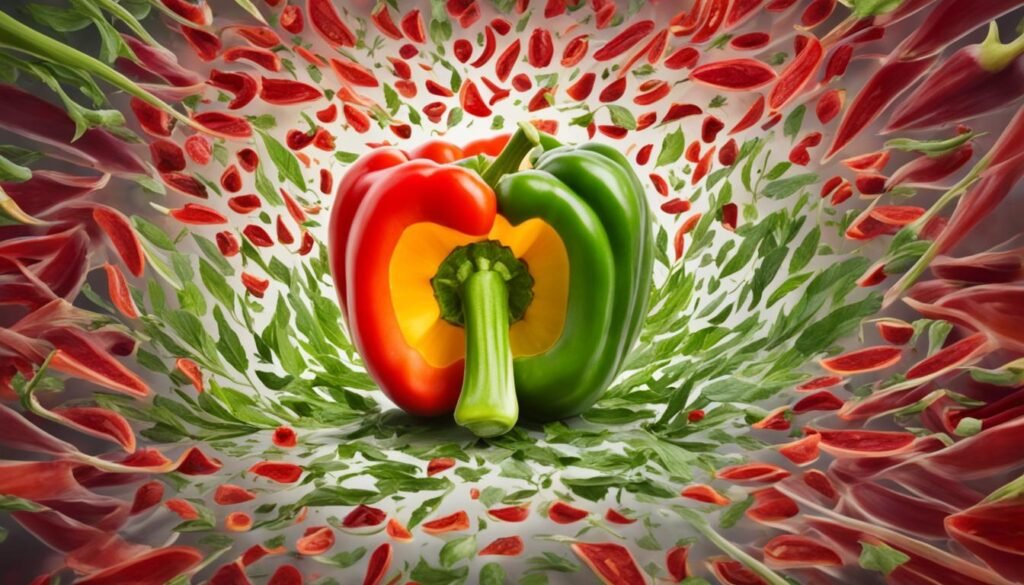
Bell peppers, whether red or yellow, are an incredible addition to your diet when it comes to improving skin health. Not only do they add a delightful crunch and burst of flavor to your meals, but they also provide an array of nutrients that promote skin elasticity and firmness.
Beta-carotene, the pigment responsible for their vibrant colors, is abundant in bell peppers. The body converts beta-carotene into vitamin A, a crucial nutrient for maintaining healthy skin. Vitamin A acts as a natural sunblock, protecting your skin from harmful UV rays and environmental damage.
In addition to beta-carotene, bell peppers are a fantastic source of vitamin C. This essential vitamin plays a vital role in collagen production, the protein responsible for keeping the skin firm and strong. By enhancing collagen synthesis, vitamin C helps maintain the elasticity and structure of your skin, contributing to a more youthful appearance.
Furthermore, bell peppers are rich in antioxidants that combat free radicals, which can cause oxidative stress and damage to the skin. These antioxidants help neutralize harmful molecules, preserving the health and vitality of your skin.
To fully reap the benefits of bell peppers for your skin, incorporate them into your diet regularly. Enjoy them raw in salads, as a crunchy dipper in hummus, or sautéed in stir-fries. Their versatility and nutrient density make them a valuable addition to any meal plan.
| Nutrient | Amount per 100g (Raw Bell Pepper) |
|---|---|
| Calories | 31 |
| Carbohydrates | 6.0g |
| Fiber | 2.1g |
| Fat | 0.3g |
| Protein | 1.3g |
| Vitamin A | 3131IU (62% DV) |
| Vitamin C | 127.7mg (213% DV) |
| Potassium | 211mg (6% DV) |
The Skin-Nourishing Properties of Broccoli
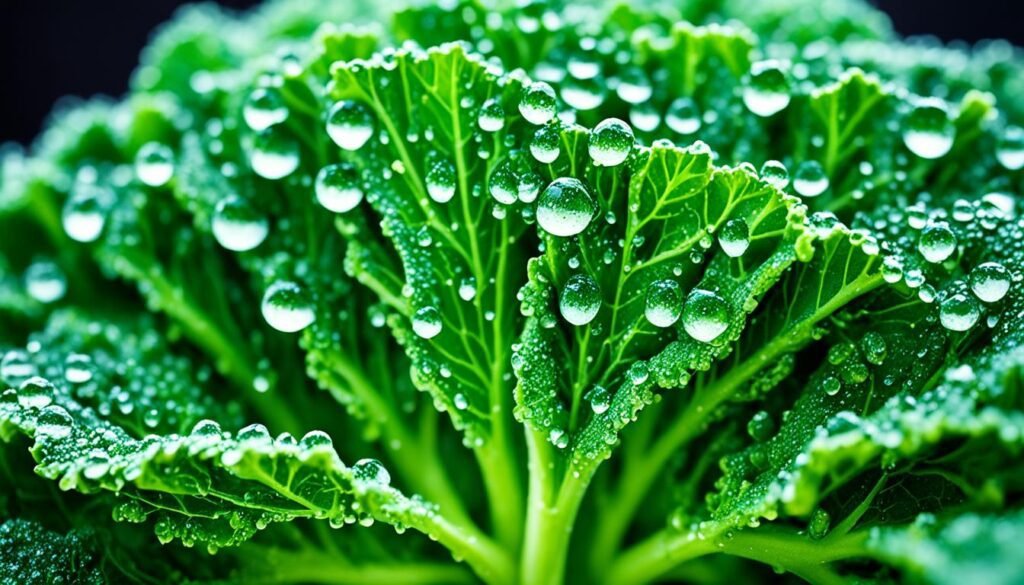
When it comes to skin health, broccoli is a powerhouse of nutrients that can enhance skin elasticity and promote a radiant complexion. This cruciferous vegetable is packed with vitamins, minerals, and carotenoids that nourish and protect the skin.
Broccoli is rich in essential vitamins, including vitamin A and vitamin C, which are crucial for maintaining healthy skin. Vitamin A helps regulate skin cell turnover, while vitamin C promotes collagen production, a protein that gives the skin its structure and elasticity.
Furthermore, broccoli contains important minerals like zinc, which plays a vital role in skin health. Zinc helps regulate oil production, reduces inflammation, and aids in wound healing. It also contributes to maintaining a clear complexion and preventing acne breakouts.
Certain carotenoids found in broccoli, such as lutein, act as powerful antioxidants. These antioxidants protect the skin from oxidative damage caused by free radicals, reducing dryness and the appearance of wrinkles. Additionally, the sulforaphane present in broccoli has potential anti-cancer effects and acts as a natural defense against sun damage.
Incorporating broccoli into your diet can provide your skin with the necessary vitamins, minerals, and antioxidants. Whether steamed, roasted, or added to salads and stir-fries, broccoli is a versatile and nutritious vegetable that can boost skin health and enhance skin elasticity.
| Nutrient | Amount per 100g |
|---|---|
| Vitamin A | 623 IU |
| Vitamin C | 89.2 mg |
| Zinc | 0.41 mg |
| Lutein | 1.54 mg |
Table: Nutritional Content of Broccoli per 100g
Tomatoes for Radiant Skin

When it comes to improving skin elasticity and maintaining a radiant complexion, tomatoes are an excellent addition to your diet. Tomatoes are not only delicious but are also packed with skin-nourishing nutrients that can enhance your skin’s health and appearance.
One of the key nutrients found in tomatoes is vitamin C. This powerful antioxidant plays a crucial role in collagen synthesis, which is essential for maintaining skin elasticity. Additionally, vitamin C helps protect the skin against sun damage and promotes a more youthful complexion.
Tomatoes are also rich in carotenoids, including lycopene. Carotenoids are potent antioxidants that help neutralize harmful free radicals, protecting the skin from oxidative stress and premature aging. Lycopene, in particular, has been linked to a reduced risk of sunburn and may provide some natural protection against UV damage.
To maximize the benefits of tomatoes for your skin, it’s recommended to consume them with a source of fat. This is because carotenoids, including lycopene, are fat-soluble, which means that pairing them with a source of healthy fat enhances their absorption by the body.
Incorporating tomatoes into your diet can be as simple as adding them to salads, sandwiches, or pasta dishes. You can also enjoy them in the form of tomato-based sauces or salsas. Whatever way you choose to enjoy them, make sure to savor the skin-boosting benefits of tomatoes for a healthier and more radiant complexion.
Nutritional Content of Tomatoes
table {
width: 100%;
border-collapse: collapse;
}
th, td {
padding: 8px;
text-align: left;
border-bottom: 1px solid #ddd;
}
th {
background-color: #f2f2f2;
}
| Nutrient | Amount per 100g |
|---|---|
| Calories | 18 |
| Carbohydrates | 3.9g |
| Protein | 0.9g |
| Fat | 0.2g |
| Fiber | 1.2g |
| Vitamin C | 14mg |
| Vitamin A | 257mcg |
| Lycopene | 3.0mg |
The Skin-Protecting Effects of Soy
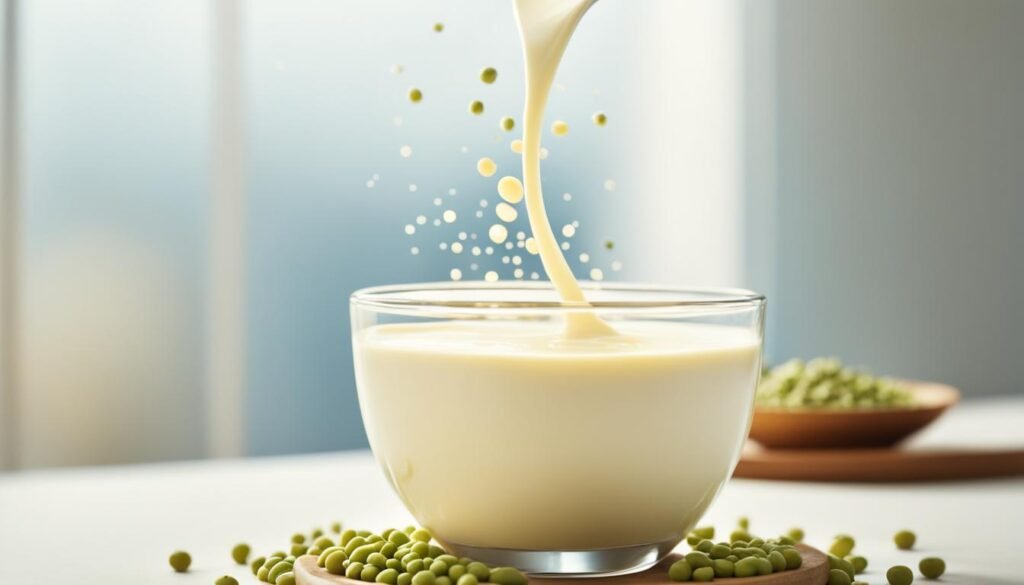
Soy is a powerhouse ingredient when it comes to skin health. It is rich in isoflavones, which are plant compounds known for their numerous benefits, especially for the skin. Studies have shown that consuming soy isoflavones can have a significant impact on skin elasticity and reduce the appearance of fine wrinkles, particularly in middle-aged women. These compounds work by promoting collagen production, a protein essential for maintaining the skin’s firmness and strength.
One of the key advantages of soy is its ability to improve skin dryness. As we age, the skin tends to become drier, which can lead to a loss of elasticity. Soy can help combat this issue by increasing the skin’s moisture levels, resulting in a healthier and more supple complexion.
Furthermore, soy offers additional protection against skin damage. The isoflavones found in soy have antioxidant properties, which help shield the skin from oxidative stress caused by free radicals. This protection is particularly valuable during menopause when estrogen levels decline. Soy can help mitigate the effects of hormone fluctuations, protecting the skin from damage and maintaining its overall health.
Adding soy to your diet is a simple and effective way to promote skin health. Incorporate soy-based products such as tofu, soy milk, or edamame into your meals for a natural boost of isoflavones. It’s important to note that if you have any existing medical conditions or concerns, it’s best to consult with a healthcare professional before making significant changes to your diet.
“Including soy in your diet is a natural and nutritious way to support skin health and maintain its elasticity.” – Dermatologist Dr. Jane Collins
Conclusion
Achieving healthier and more elastic skin starts with a commitment to a healthy diet. By incorporating specific foods into your daily meals, you can provide your skin with the essential nutrients it needs to maintain its elasticity and overall health.
Foods such as fatty fish, avocados, walnuts, and sweet potatoes are rich in omega-3 fatty acids, healthy fats, vitamins, and minerals that nourish and protect your skin. These nutrients help maintain skin thickness, reduce inflammation, protect against sun damage, and promote collagen production.
In addition to these foods, incorporating bell peppers, broccoli, tomatoes, soy, and sunflower seeds into your diet provides you with a variety of antioxidants, carotenoids, and isoflavones that protect your skin from oxidative damage and improve its radiance.
By adopting a balanced and wholesome diet, you are taking natural and effective steps towards achieving healthier and more elastic skin. Remember to prioritize these nutrient-rich foods, and your skin will thank you with its radiant and youthful appearance.
FAQ
How does a healthy diet improve skin elasticity?
A healthy diet provides the necessary nutrients and antioxidants that nourish the skin and promote elasticity. Specific foods rich in antioxidants and essential nutrients can help improve skin health and maintain its elasticity.
What are the best foods for improving skin elasticity?
Foods that are high in antioxidants, healthy fats, vitamins, and minerals are beneficial for improving skin elasticity. Some examples include fatty fish like salmon, avocados, walnuts, sunflower seeds, sweet potatoes, bell peppers, broccoli, tomatoes, and soy.
How do fatty fish and omega-3 fatty acids aid in improving skin elasticity?
Fatty fish, such as salmon and mackerel, are rich sources of omega-3 fatty acids. These essential fatty acids help maintain skin thickness, reduce inflammation, protect against UV rays, and promote collagen production. Fish oil supplements can also be beneficial for improving skin conditions.
What are the benefits of avocados for skin health?
Avocados are rich in healthy fats, vitamin E, and vitamin C, which are essential for maintaining skin health. The fats in avocados keep the skin flexible and moisturized, while the vitamins act as antioxidants and protect the skin from sun damage. Avocados also contribute to collagen production, promoting overall skin elasticity.
How do walnuts promote skin elasticity?
Walnuts contain a balanced combination of omega-3 and omega-6 fatty acids, zinc, vitamin E, selenium, and protein. These nutrients help reduce inflammation, regulate skin health, protect against inflammation and free radicals, and contribute to the health and integrity of the skin.
What are the skin-boosting effects of sunflower seeds?
Sunflower seeds provide essential nutrients such as vitamin E, selenium, zinc, protein, and antioxidants. These nutrients promote skin health, protect the skin cells from damage, regulate inflammation, and contribute to the strength and elasticity of the skin.
How do sweet potatoes benefit skin health?
Sweet potatoes are a valuable source of beta-carotene, which is converted into vitamin A in the body. Beta-carotene acts as a natural sunblock, protecting the skin from sun damage and preventing signs of aging. Other carotenoids present in sweet potatoes also act as antioxidants, maintaining the health and elasticity of the skin.
Why are bell peppers beneficial for skin health?
Bell peppers are rich in beta-carotene, which the body converts into vitamin A. Vitamin A is vital for maintaining healthy skin and acts as a natural sunblock. Bell peppers are also an excellent source of vitamin C, which promotes collagen production, the protein responsible for keeping the skin firm and strong.
How does broccoli contribute to skin health?
Broccoli is packed with vitamins, minerals, and carotenoids that promote skin health. It contains zinc, vitamin A, and vitamin C, which are crucial for the health and elasticity of the skin. The antioxidants and sulforaphane in broccoli protect the skin from oxidative damage and sun damage, reducing dryness and wrinkles.
What are the skin benefits of tomatoes?
Tomatoes are rich in vitamin C and various carotenoids, including lycopene. These nutrients provide protection against sun damage, prevent wrinkles, and promote a radiant complexion. The antioxidants in tomatoes contribute to overall skin health when consumed with a source of fat for enhanced absorption.
How does soy affect skin elasticity?
Soy contains isoflavones, which can improve skin elasticity, reduce wrinkles, and increase collagen production, particularly in women during menopause. Soy isoflavones may also protect the skin from damage and inflammation, contributing to overall skin health.
How does a healthy diet improve skin elasticity and overall skin health?
By incorporating specific foods into your diet that are rich in antioxidants, healthy fats, vitamins, and minerals, you can provide your skin with the essential nutrients necessary for maintaining skin elasticity and promoting overall skin health.

